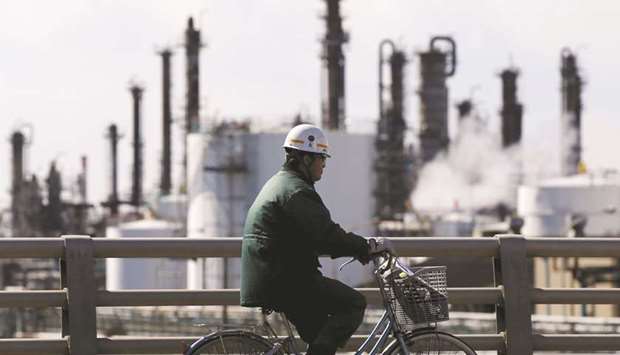Business investment in Japan has been a rare bright spot in the world’s third-largest economy but that may now be fading amid anxiety over an upcoming sales tax hike and global trade frictions, a Reuters monthly corporate survey showed.
Just over half, or 56%, predict domestic investment in factories and equipment will be flat in the next fiscal year that starts in April, while 30% project an increase and 14% a decline, the survey of more than 250 companies in Japan found.
The outlook for foreign capital expenditure was even less optimistic: two-thirds of firms expect that to remain unchanged while 19% see a rise and 15% a drop.
Figures out on Monday suggested a slump in demand may have already started.
Overseas orders for Japanese machinery posted their biggest fall in more than a decade in December and manufacturers expect orders to sink further as trade friction weighs on global demand.
“We have no choice but to become cautious when we take into account the global slowdown,” a manager of a transport equipment manufacturer said in the survey.
Respondents’ answers to questions and comments in the survey are anonymous.
“There’s growing uncertainty in our overseas outlook due to the US-China trade war and Brexit,” a transportation firm manager wrote.
The darker outlook comes after upbeat results from the December “tankan” survey, which showed that major corporations plan to raise investment by an average 14.3% for this fiscal year, the highest since 1990, at the end of Japan’s Bubble Era.
Despite gloom surrounding the external environment, more than two-thirds of respondents want Japan’s proposed tax hike to 10% from 8%, scheduled for October, to go ahead, the survey showed.
“The sales tax must be raised this time. Japan’s public finances will collapse sooner or later, which would throw the economy into turmoil, if the current balance between revenue and expenditure is left unattended,” said an electric machinery maker manager.
Japan’s mounting public debt, at more than twice the size of its economy, is the industrial world’s heaviest.
Additionally, many firms expect to make investment in cutting-edge technologies such as artificial intelligence and the Internet of Things to expand.
Popular investments include labour-saving efforts, boosting capacity and research and development, the February 1-14 poll showed.
Jitters over trade friction and the tax hike are also keeping a lid on wage gains.
Some 51% of companies polled expect wages to rise around 1.5%-2% at annual spring wage talks between unions and companies.
That’s lower than last year’s 2.07% average across all Japanese industries.
One-third of firms see wage hikes of under 1.5% and the remainder expect them to rise 2.1% or more.
Since taking office in late 2012, Prime Minister Shinzo Abe has been pushing companies to raise wages by around 2% to stimulate growth, and many companies have acquiesced.
Companies are wary of raising wages, even though many have been raking in hefty profits, because it commits them to higher fixed personnel costs at a time of uncertainty.
“Japanese firms are probably turning cautious about wage hikes out of fear that the US-China trade friction may cause a deteriorating economic outlook,” a manager of a machinery maker wrote in the survey, compiled for Reuters by Nikkei Research. “Even though the outlook is murky, we hope to raise wages to an extent that would help employees keep their living standards and cope with the October tax hike,” another machinery maker manager wrote.
Steps to improve working conditions will also be in focus during this year’s labour talks, as part of Abe’s reforms to curb Japan’s notoriously long work hours and narrow the pay and benefit gap between salaried employees and contract or part-time workers.
The survey showed that half of Japanese firms expect overall personnel costs to increase in the coming fiscal year as they seek to encourage flexible working schedules and develop talent.
Some 45% see personnel costs unchanged, while 5% see lower costs.
“Personnel costs will rise as curbing working hours per employee will force us to hire more people,” a manager at an electrical machinery maker wrote.
Japan’s retirement age is also seen as an issue given the ageing and declining population.
Currently, many firms require full-time employees to retire at 60, with an option of five more years’ work for reduced pay and terms, however, the government is considering raising the age at which people would be eligible to receive pension benefits to 75 eventually.
When asked the age to which firms could raise their employees’ retirement, 89% chose 65, and the rest opted for 70.

A worker cycles near a factory at the Keihin industrial zone in Kawasaki. Business investment in Japan has been a rare bright spot in the world’s third-largest economy but that may now be fading amid anxiety over an upcoming sales tax hike and global trade frictions, a Reuters monthly corporate survey showed.
